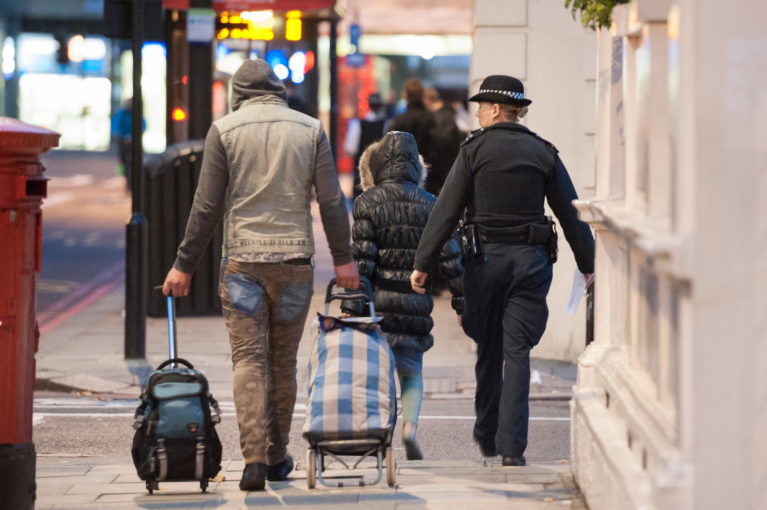Homelessness and public spaces / PSPOs
Poverty no longer penalised in landmark Liberty legal action
Posted on 15 Dec 2020
- Liberty client ends lawsuit against misuse of blunt council powers to punish poverty
- Bournemouth, Christchurch and Poole Council scrap the crueller elements of Public Spaces Protection Order
- Case shows councils across country they must help homeless people, not criminalise them
Liberty has closed landmark legal action against Bournemouth, Christchurch and Poole (BCP) Council after it agreed to scrap parts of a Public Spaces Protection Order (PSPO) that punish poverty.
In the first case brought over councils using PSPOs to criminalise rough sleeping and begging, Liberty client Sarah Ward was due to go to the High Court to argue BCP Council’s PSPO breaches human rights laws.
Yesterday, Liberty and Sarah Ward formally closed that legal proceeding after the council removed the provisions that penalise rough sleeping and begging from its PSPO.
PSPOs were introduced as council powers in 2014 and, as homelessness has continued to rise, have increasingly been used as blunt tools to criminalise rough sleeping and begging – wrongly equating poverty with anti-social behaviour. Liberty has campaigned against the use of PSPOs, arguing that the blunt powers frequently lead to cruel treatment of people on the streets and criminalise poverty.
With BCP Council accepting all of Sarah Ward and Liberty’s requests, the case sends a resounding message to councils across the country that PSPOs cannot be used to criminalise poverty.
Sarah Ward said: “I’m pleased the Council has seen sense and agreed to change this broken approach without us needing to go to through the time, heartache and expense of a final hearing. Other councils must take note and follow in the Council’s footsteps – threatening people with a PSPO is neither a legitimate or fair measure to treat people rough sleeping or begging. Being homeless should not be treated as a crime and we can now focus on trying to provide the support people need.”
Liberty lawyer Lara ten Caten said: “The agreement with the Council is a victory for fairness, dignity and respect. If you’re rough sleeping or begging, that isn’t a lifestyle choice, that’s poverty. Instead of addressing the complex issues underlying homelessness, too many councils have resorted to blunt powers to punish poverty and push poor people out of sight.
“PSPOs remain ripe for abuse and should be scrapped, but this case should send a message to all councils that PSPOs should never be used to criminalise rough sleeping.”
Liberty regularly responds to council consultations to warn of the risk that criminalising begging and rough sleeping could breach the guidance and human rights laws. Several councils, including Birmingham, Newport and Manchester have subsequently amended or scrapped their proposed orders.
Background
Poole Council (which merged with Bournemouth and Christchurch in April 2019) introduced the PSPO in April 2018.
The PSPO prohibited:
- Causing “an obstruction in any doorway belonging to any retail, licenced or commercial premises or public buildings, or any car park or public area, including hallways, landing”.
- Leaving “personal belongings, such as bedding, bags etc” unattended.
- Begging, including “sitting or loitering in a public place with any receptacle used to contain monies from the public for the purpose of personal gain”.
Breaching these conditions can result in a £100 fine or prosecution.
Sarah Ward, who worked in homelessness services in London and Poole, was among many local residents who raised concerns about the effects of the PSPO. A petition to block the Order was launched by residents and gained thousands of signatures.
In bringing the case, represented by Liberty, she argued the PSPO breaches human rights laws and Home Office guidance.
Contact the Liberty press office on 07973 831 128 or pressoffice@libertyhumanrights.org.uk
I'm looking for advice on this
Did you know Liberty offers free human rights legal advice?
What are my rights on this?
Find out more about your rights and how the Human Rights Act protects them
Did you find this content useful?
Help us make our content even better by letting us know whether you found this page useful or not


